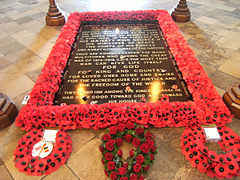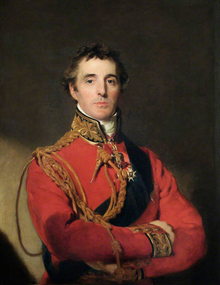Memorials of 'Britons Hall of Fame' at The National Memorial Gardens
The following Britons have been inducted into 'Britons Hall of Fame', and have memorials at The National Memorial Gardens:
The Unknown Warrior

(28 July 1914 - 11 November 1918)
An unidentified British soldier killed on a European battlefield during the First World War. He was buried in Westminster Abbey, London on 11 November 1920, to honour the unknown dead of the First World War.
Diana, Princess of Wales
.jpg)
(1 July 1961 - 31 August 1997)
First wife of Charles, Prince of Wales between 1981 and 1996, and mother of Prince William, Duke of Cambridge
Sir Winston Churchill

(30 November 1874 - 24 January 1965)
Prime Minister during World War II, historically ranked as the greatest British Prime Minister, and widely regarded as one of the greatest wartime leaders of the 20th Century.
Lord Nelson

(29 September 1758 - 21 October 1805)
Famous for his service in the Royal Navy, particularly during the Napoleonic Wars, and specifically at the Battle of Trafalgar in 1805.
Duke of Wellington

(1 May 1769 - 14 September 1852)
Soldier and statesman, and one of the leading military and political figures of 19th-century Britain due to defeat of Napoleon at the Battle of Waterloo in 1815.
Charles Darwin

(12 February 180 - 19 April 1882)
A naturalist and geologist, he was the originator of the theory of evolution through natural selection, and author of 'On the Origin of Species" published in 1859.
Isambard Kingdom Brunel

(9 April 1806 - 15 September 1859)
A mechanical and civil engineer who is considered "one of the greatest figures of the Industrial Revolution", builder of the Great Western Railway, and designer of numerous significant ships, tunnels and bridges.
William Shakespeare

(26 April 1564 - 23 April 1616)
Was a poet, playwright, and actor, and widely regarded as the greatest writer in the English language, and the world's pre-eminent dramatist.
Sir Isaac Newton

(5 December 1642 - 20 March 1727)
Originator of universal gravitation and laws of classical mechanics and laws of motion. His 'Principia" is one of the most influential works in the history of science.
Queen Elizabeth I

(7 September 1533 - 24 March 1603)
Popular monarch of England who brought a period of relative internal stability. She is associated with the defeat of the Spanish Armada in 1588.
